Dynamic Organizational Leaders Disapprove of Traditional Management Tools
VerifiedAdded on 2022/01/19
|8
|1875
|120
AI Summary
In organizational settings, motivation enables employees to have positive outlook on responsibilities at various levels of interaction (Schermerhorn, 2012). According to management experts, it is important for organizational leaders to develop knowledge regarding motivational theories that guide various undertakings within corporate contexts. Organization motivation plan In order to design proper organization motivation plan, it is important for corporate leaders to consider core and pertinent realities that suffice within diverse contexts. This analysis should involve clear understanding with regard to inherent factors that support such propagation of
Contribute Materials
Your contribution can guide someone’s learning journey. Share your
documents today.
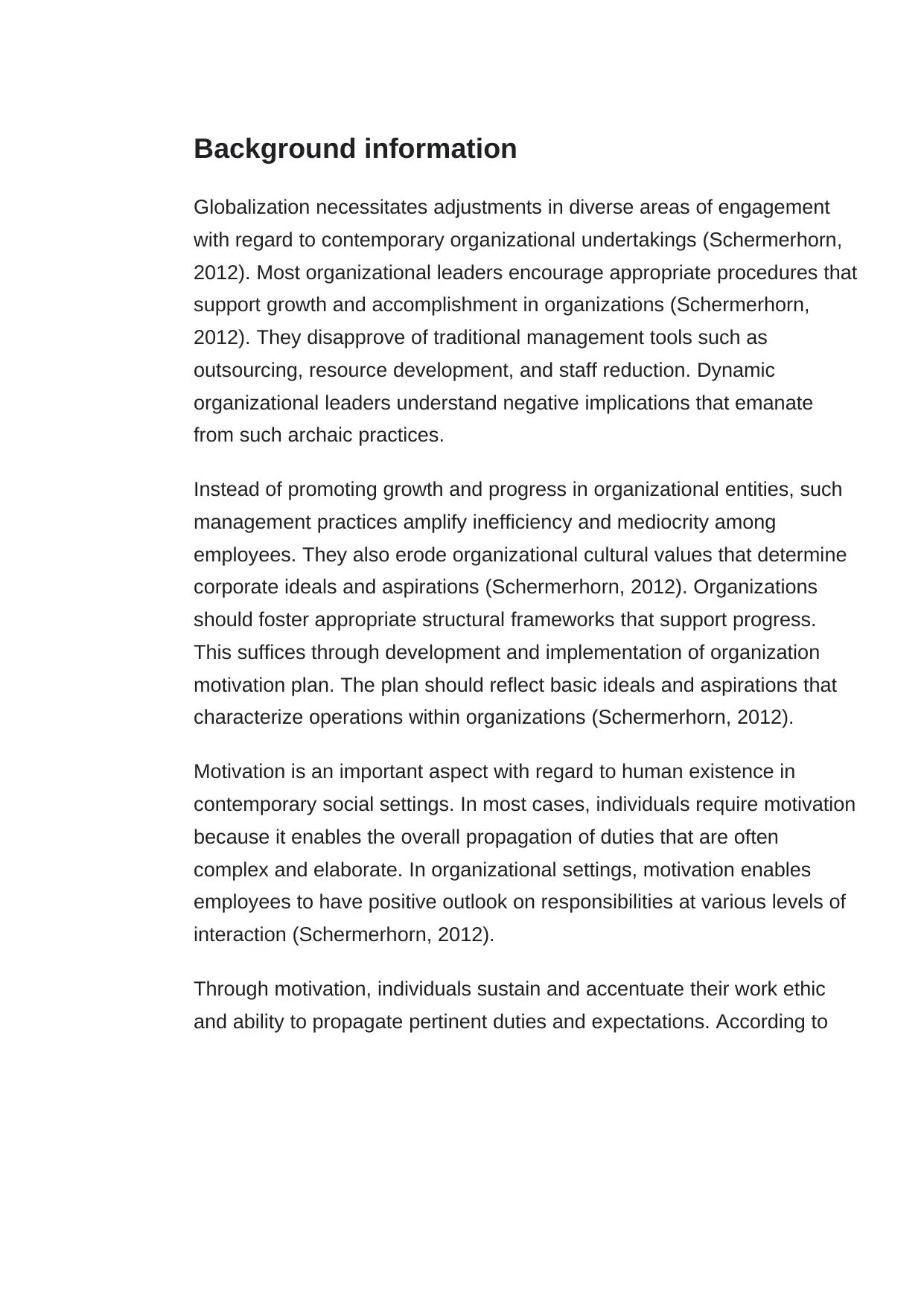
Background information
Globalization necessitates adjustments in diverse areas of engagement
with regard to contemporary organizational undertakings (Schermerhorn,
2012). Most organizational leaders encourage appropriate procedures that
support growth and accomplishment in organizations (Schermerhorn,
2012). They disapprove of traditional management tools such as
outsourcing, resource development, and staff reduction. Dynamic
organizational leaders understand negative implications that emanate
from such archaic practices.
Instead of promoting growth and progress in organizational entities, such
management practices amplify inefficiency and mediocrity among
employees. They also erode organizational cultural values that determine
corporate ideals and aspirations (Schermerhorn, 2012). Organizations
should foster appropriate structural frameworks that support progress.
This suffices through development and implementation of organization
motivation plan. The plan should reflect basic ideals and aspirations that
characterize operations within organizations (Schermerhorn, 2012).
Motivation is an important aspect with regard to human existence in
contemporary social settings. In most cases, individuals require motivation
because it enables the overall propagation of duties that are often
complex and elaborate. In organizational settings, motivation enables
employees to have positive outlook on responsibilities at various levels of
interaction (Schermerhorn, 2012).
Through motivation, individuals sustain and accentuate their work ethic
and ability to propagate pertinent duties and expectations. According to
Globalization necessitates adjustments in diverse areas of engagement
with regard to contemporary organizational undertakings (Schermerhorn,
2012). Most organizational leaders encourage appropriate procedures that
support growth and accomplishment in organizations (Schermerhorn,
2012). They disapprove of traditional management tools such as
outsourcing, resource development, and staff reduction. Dynamic
organizational leaders understand negative implications that emanate
from such archaic practices.
Instead of promoting growth and progress in organizational entities, such
management practices amplify inefficiency and mediocrity among
employees. They also erode organizational cultural values that determine
corporate ideals and aspirations (Schermerhorn, 2012). Organizations
should foster appropriate structural frameworks that support progress.
This suffices through development and implementation of organization
motivation plan. The plan should reflect basic ideals and aspirations that
characterize operations within organizations (Schermerhorn, 2012).
Motivation is an important aspect with regard to human existence in
contemporary social settings. In most cases, individuals require motivation
because it enables the overall propagation of duties that are often
complex and elaborate. In organizational settings, motivation enables
employees to have positive outlook on responsibilities at various levels of
interaction (Schermerhorn, 2012).
Through motivation, individuals sustain and accentuate their work ethic
and ability to propagate pertinent duties and expectations. According to
Secure Best Marks with AI Grader
Need help grading? Try our AI Grader for instant feedback on your assignments.
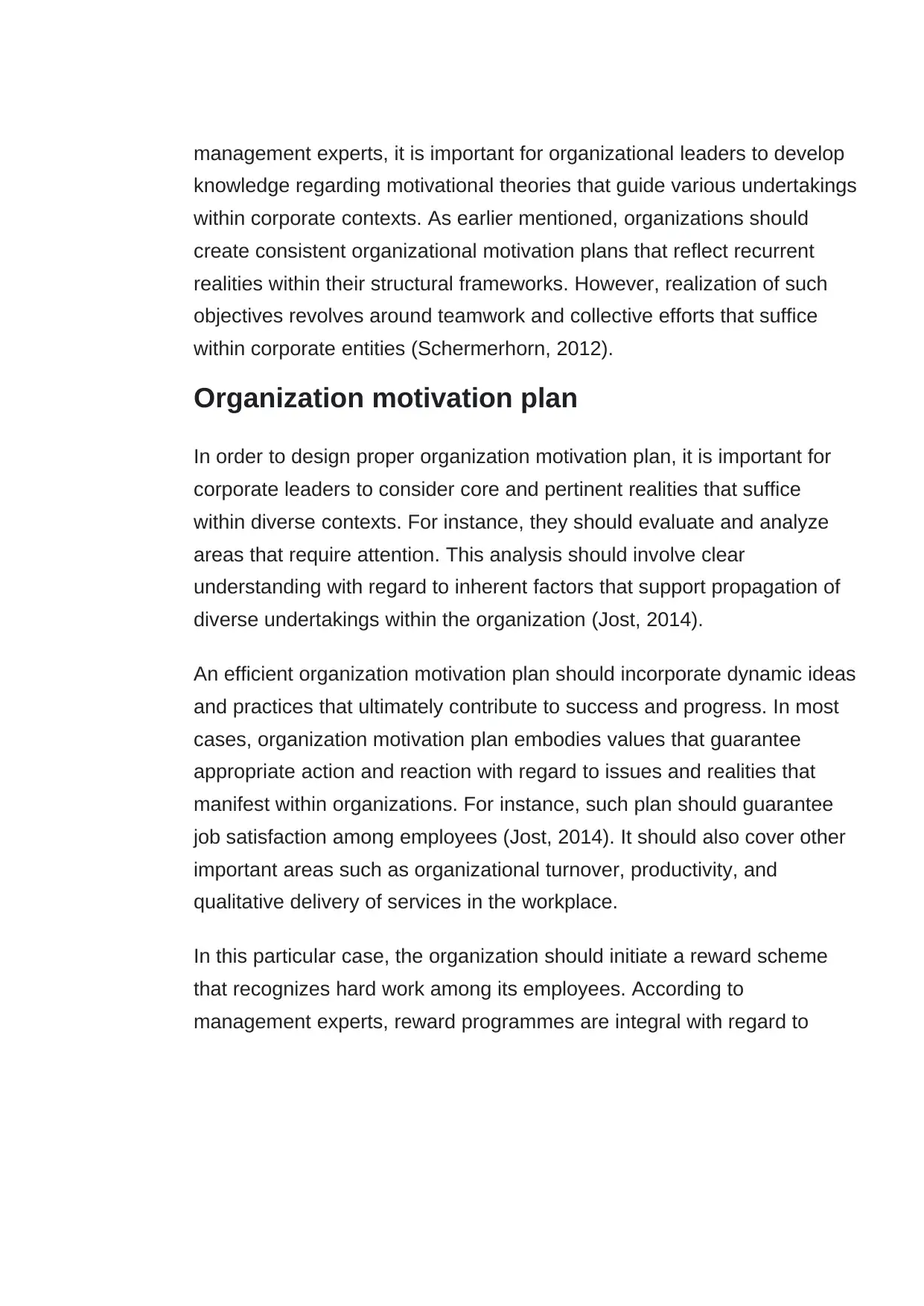
management experts, it is important for organizational leaders to develop
knowledge regarding motivational theories that guide various undertakings
within corporate contexts. As earlier mentioned, organizations should
create consistent organizational motivation plans that reflect recurrent
realities within their structural frameworks. However, realization of such
objectives revolves around teamwork and collective efforts that suffice
within corporate entities (Schermerhorn, 2012).
Organization motivation plan
In order to design proper organization motivation plan, it is important for
corporate leaders to consider core and pertinent realities that suffice
within diverse contexts. For instance, they should evaluate and analyze
areas that require attention. This analysis should involve clear
understanding with regard to inherent factors that support propagation of
diverse undertakings within the organization (Jost, 2014).
An efficient organization motivation plan should incorporate dynamic ideas
and practices that ultimately contribute to success and progress. In most
cases, organization motivation plan embodies values that guarantee
appropriate action and reaction with regard to issues and realities that
manifest within organizations. For instance, such plan should guarantee
job satisfaction among employees (Jost, 2014). It should also cover other
important areas such as organizational turnover, productivity, and
qualitative delivery of services in the workplace.
In this particular case, the organization should initiate a reward scheme
that recognizes hard work among its employees. According to
management experts, reward programmes are integral with regard to
knowledge regarding motivational theories that guide various undertakings
within corporate contexts. As earlier mentioned, organizations should
create consistent organizational motivation plans that reflect recurrent
realities within their structural frameworks. However, realization of such
objectives revolves around teamwork and collective efforts that suffice
within corporate entities (Schermerhorn, 2012).
Organization motivation plan
In order to design proper organization motivation plan, it is important for
corporate leaders to consider core and pertinent realities that suffice
within diverse contexts. For instance, they should evaluate and analyze
areas that require attention. This analysis should involve clear
understanding with regard to inherent factors that support propagation of
diverse undertakings within the organization (Jost, 2014).
An efficient organization motivation plan should incorporate dynamic ideas
and practices that ultimately contribute to success and progress. In most
cases, organization motivation plan embodies values that guarantee
appropriate action and reaction with regard to issues and realities that
manifest within organizations. For instance, such plan should guarantee
job satisfaction among employees (Jost, 2014). It should also cover other
important areas such as organizational turnover, productivity, and
qualitative delivery of services in the workplace.
In this particular case, the organization should initiate a reward scheme
that recognizes hard work among its employees. According to
management experts, reward programmes are integral with regard to
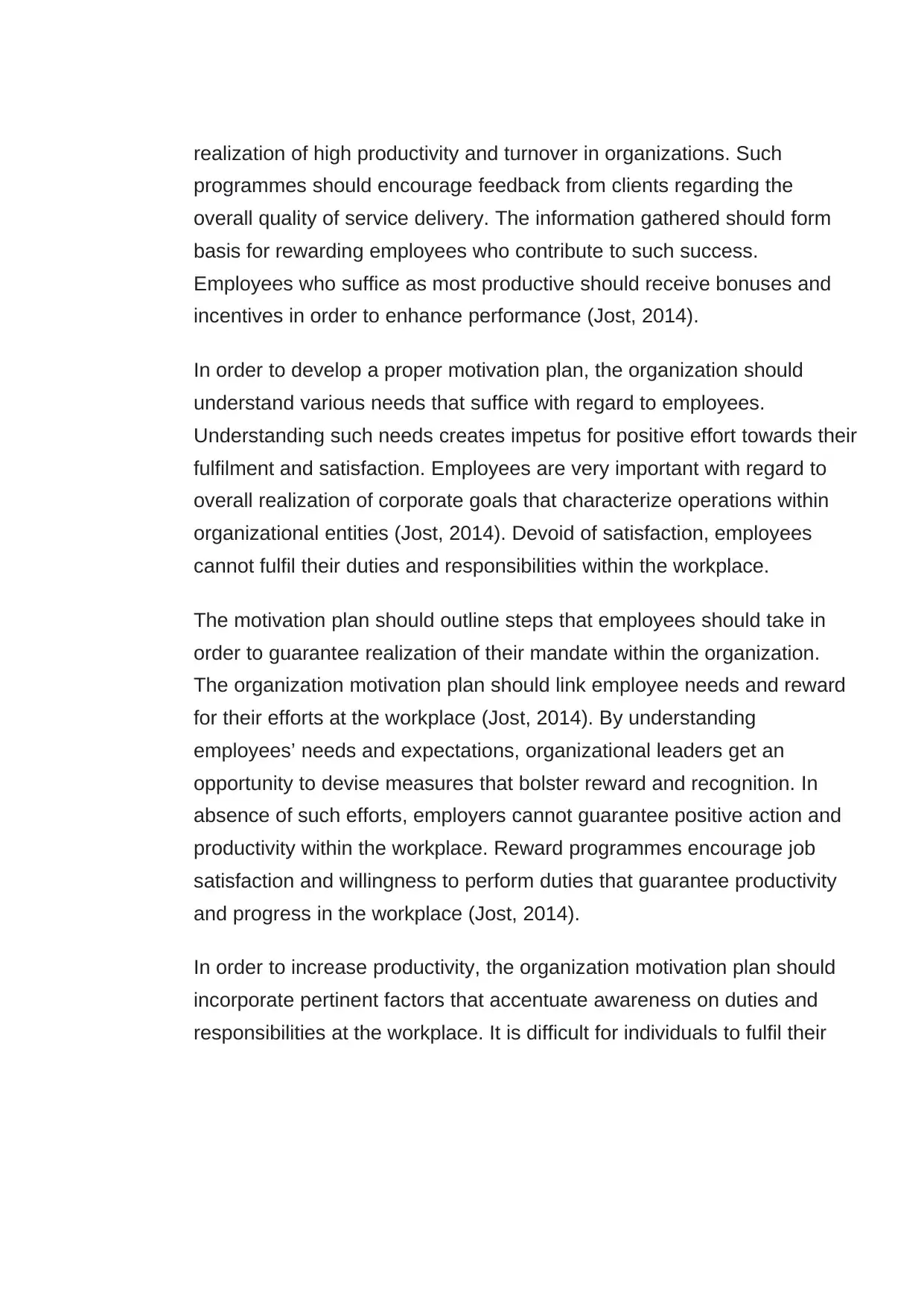
realization of high productivity and turnover in organizations. Such
programmes should encourage feedback from clients regarding the
overall quality of service delivery. The information gathered should form
basis for rewarding employees who contribute to such success.
Employees who suffice as most productive should receive bonuses and
incentives in order to enhance performance (Jost, 2014).
In order to develop a proper motivation plan, the organization should
understand various needs that suffice with regard to employees.
Understanding such needs creates impetus for positive effort towards their
fulfilment and satisfaction. Employees are very important with regard to
overall realization of corporate goals that characterize operations within
organizational entities (Jost, 2014). Devoid of satisfaction, employees
cannot fulfil their duties and responsibilities within the workplace.
The motivation plan should outline steps that employees should take in
order to guarantee realization of their mandate within the organization.
The organization motivation plan should link employee needs and reward
for their efforts at the workplace (Jost, 2014). By understanding
employees’ needs and expectations, organizational leaders get an
opportunity to devise measures that bolster reward and recognition. In
absence of such efforts, employers cannot guarantee positive action and
productivity within the workplace. Reward programmes encourage job
satisfaction and willingness to perform duties that guarantee productivity
and progress in the workplace (Jost, 2014).
In order to increase productivity, the organization motivation plan should
incorporate pertinent factors that accentuate awareness on duties and
responsibilities at the workplace. It is difficult for individuals to fulfil their
programmes should encourage feedback from clients regarding the
overall quality of service delivery. The information gathered should form
basis for rewarding employees who contribute to such success.
Employees who suffice as most productive should receive bonuses and
incentives in order to enhance performance (Jost, 2014).
In order to develop a proper motivation plan, the organization should
understand various needs that suffice with regard to employees.
Understanding such needs creates impetus for positive effort towards their
fulfilment and satisfaction. Employees are very important with regard to
overall realization of corporate goals that characterize operations within
organizational entities (Jost, 2014). Devoid of satisfaction, employees
cannot fulfil their duties and responsibilities within the workplace.
The motivation plan should outline steps that employees should take in
order to guarantee realization of their mandate within the organization.
The organization motivation plan should link employee needs and reward
for their efforts at the workplace (Jost, 2014). By understanding
employees’ needs and expectations, organizational leaders get an
opportunity to devise measures that bolster reward and recognition. In
absence of such efforts, employers cannot guarantee positive action and
productivity within the workplace. Reward programmes encourage job
satisfaction and willingness to perform duties that guarantee productivity
and progress in the workplace (Jost, 2014).
In order to increase productivity, the organization motivation plan should
incorporate pertinent factors that accentuate awareness on duties and
responsibilities at the workplace. It is difficult for individuals to fulfil their
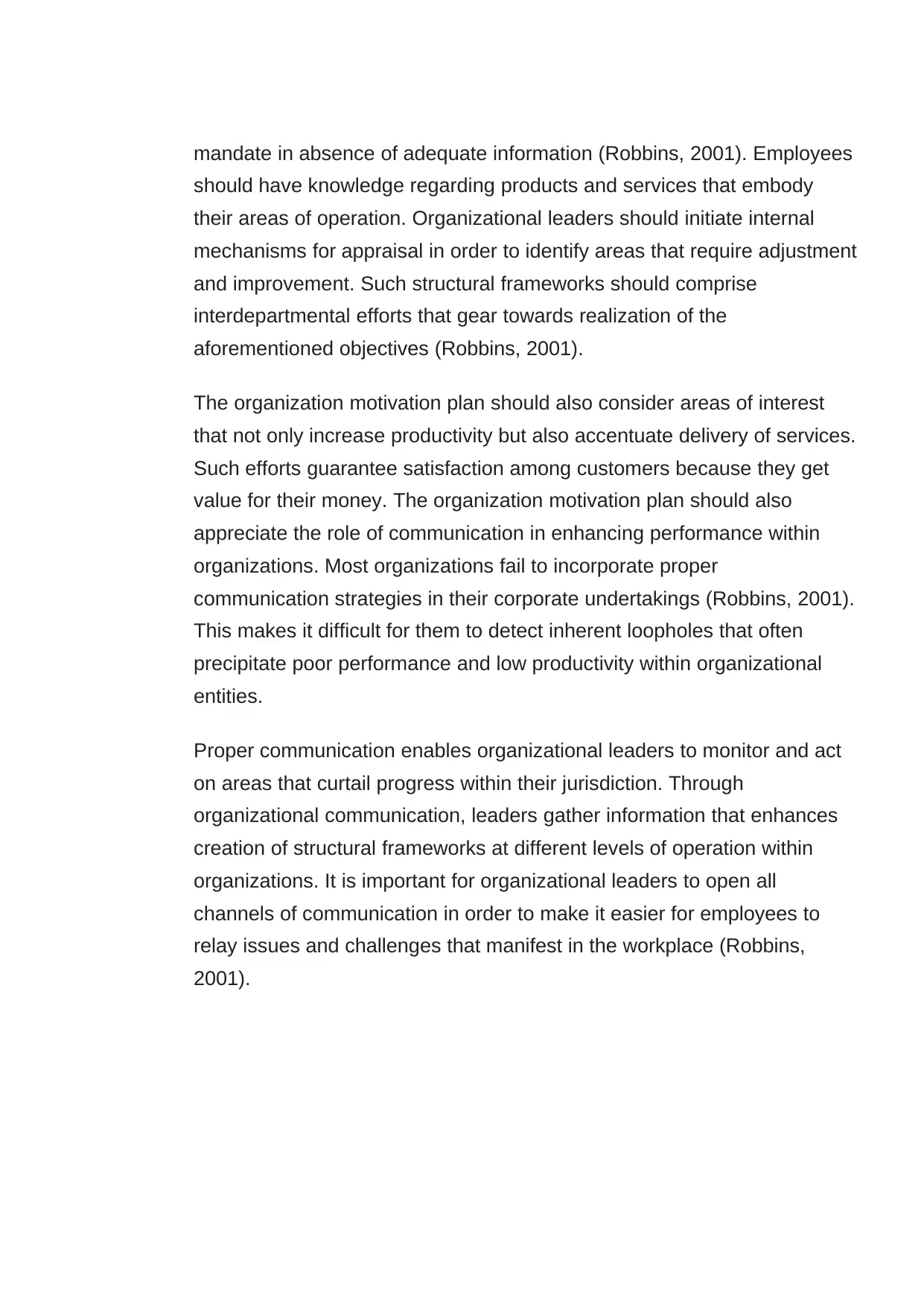
mandate in absence of adequate information (Robbins, 2001). Employees
should have knowledge regarding products and services that embody
their areas of operation. Organizational leaders should initiate internal
mechanisms for appraisal in order to identify areas that require adjustment
and improvement. Such structural frameworks should comprise
interdepartmental efforts that gear towards realization of the
aforementioned objectives (Robbins, 2001).
The organization motivation plan should also consider areas of interest
that not only increase productivity but also accentuate delivery of services.
Such efforts guarantee satisfaction among customers because they get
value for their money. The organization motivation plan should also
appreciate the role of communication in enhancing performance within
organizations. Most organizations fail to incorporate proper
communication strategies in their corporate undertakings (Robbins, 2001).
This makes it difficult for them to detect inherent loopholes that often
precipitate poor performance and low productivity within organizational
entities.
Proper communication enables organizational leaders to monitor and act
on areas that curtail progress within their jurisdiction. Through
organizational communication, leaders gather information that enhances
creation of structural frameworks at different levels of operation within
organizations. It is important for organizational leaders to open all
channels of communication in order to make it easier for employees to
relay issues and challenges that manifest in the workplace (Robbins,
2001).
should have knowledge regarding products and services that embody
their areas of operation. Organizational leaders should initiate internal
mechanisms for appraisal in order to identify areas that require adjustment
and improvement. Such structural frameworks should comprise
interdepartmental efforts that gear towards realization of the
aforementioned objectives (Robbins, 2001).
The organization motivation plan should also consider areas of interest
that not only increase productivity but also accentuate delivery of services.
Such efforts guarantee satisfaction among customers because they get
value for their money. The organization motivation plan should also
appreciate the role of communication in enhancing performance within
organizations. Most organizations fail to incorporate proper
communication strategies in their corporate undertakings (Robbins, 2001).
This makes it difficult for them to detect inherent loopholes that often
precipitate poor performance and low productivity within organizational
entities.
Proper communication enables organizational leaders to monitor and act
on areas that curtail progress within their jurisdiction. Through
organizational communication, leaders gather information that enhances
creation of structural frameworks at different levels of operation within
organizations. It is important for organizational leaders to open all
channels of communication in order to make it easier for employees to
relay issues and challenges that manifest in the workplace (Robbins,
2001).
Secure Best Marks with AI Grader
Need help grading? Try our AI Grader for instant feedback on your assignments.
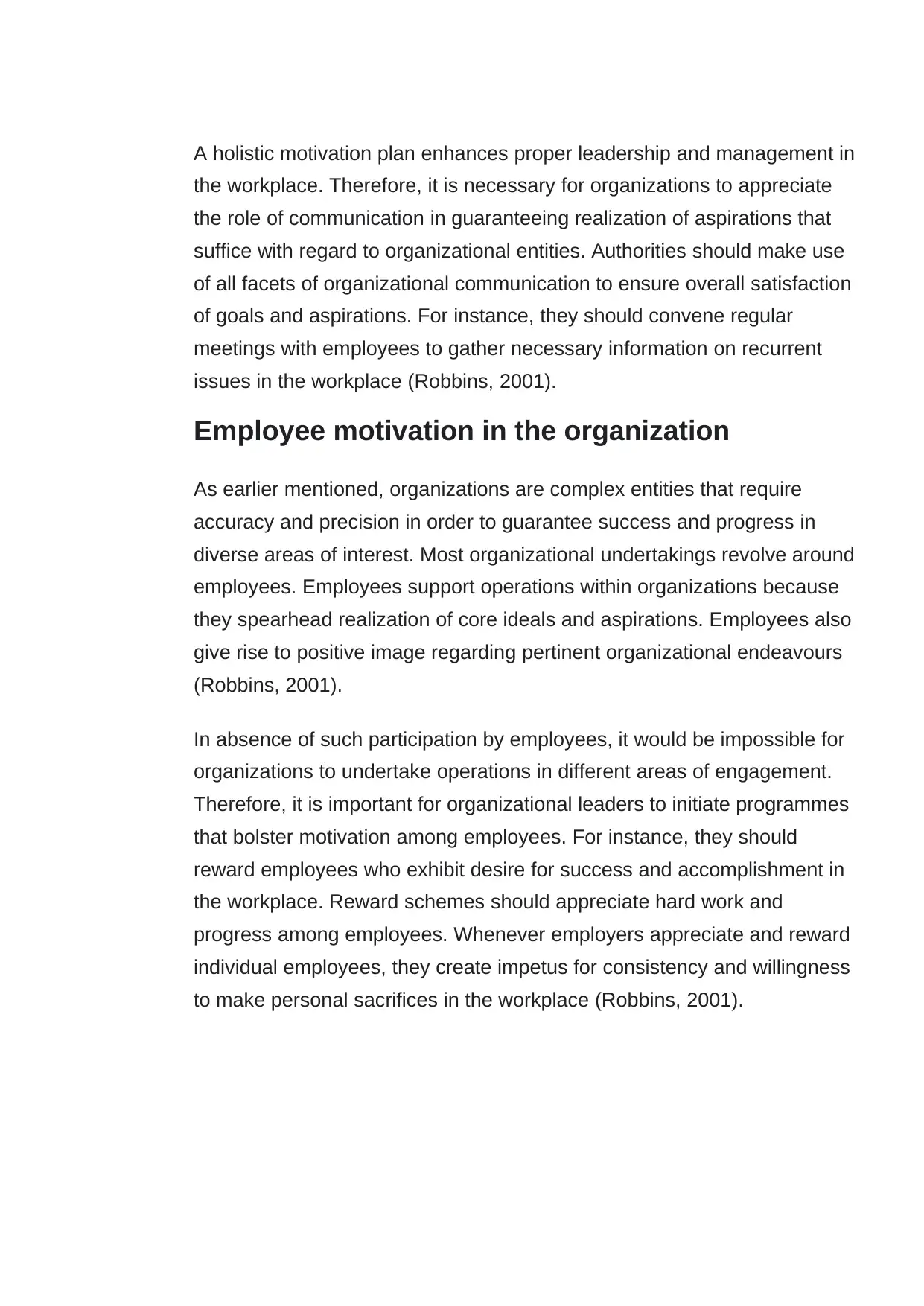
A holistic motivation plan enhances proper leadership and management in
the workplace. Therefore, it is necessary for organizations to appreciate
the role of communication in guaranteeing realization of aspirations that
suffice with regard to organizational entities. Authorities should make use
of all facets of organizational communication to ensure overall satisfaction
of goals and aspirations. For instance, they should convene regular
meetings with employees to gather necessary information on recurrent
issues in the workplace (Robbins, 2001).
Employee motivation in the organization
As earlier mentioned, organizations are complex entities that require
accuracy and precision in order to guarantee success and progress in
diverse areas of interest. Most organizational undertakings revolve around
employees. Employees support operations within organizations because
they spearhead realization of core ideals and aspirations. Employees also
give rise to positive image regarding pertinent organizational endeavours
(Robbins, 2001).
In absence of such participation by employees, it would be impossible for
organizations to undertake operations in different areas of engagement.
Therefore, it is important for organizational leaders to initiate programmes
that bolster motivation among employees. For instance, they should
reward employees who exhibit desire for success and accomplishment in
the workplace. Reward schemes should appreciate hard work and
progress among employees. Whenever employers appreciate and reward
individual employees, they create impetus for consistency and willingness
to make personal sacrifices in the workplace (Robbins, 2001).
the workplace. Therefore, it is necessary for organizations to appreciate
the role of communication in guaranteeing realization of aspirations that
suffice with regard to organizational entities. Authorities should make use
of all facets of organizational communication to ensure overall satisfaction
of goals and aspirations. For instance, they should convene regular
meetings with employees to gather necessary information on recurrent
issues in the workplace (Robbins, 2001).
Employee motivation in the organization
As earlier mentioned, organizations are complex entities that require
accuracy and precision in order to guarantee success and progress in
diverse areas of interest. Most organizational undertakings revolve around
employees. Employees support operations within organizations because
they spearhead realization of core ideals and aspirations. Employees also
give rise to positive image regarding pertinent organizational endeavours
(Robbins, 2001).
In absence of such participation by employees, it would be impossible for
organizations to undertake operations in different areas of engagement.
Therefore, it is important for organizational leaders to initiate programmes
that bolster motivation among employees. For instance, they should
reward employees who exhibit desire for success and accomplishment in
the workplace. Reward schemes should appreciate hard work and
progress among employees. Whenever employers appreciate and reward
individual employees, they create impetus for consistency and willingness
to make personal sacrifices in the workplace (Robbins, 2001).
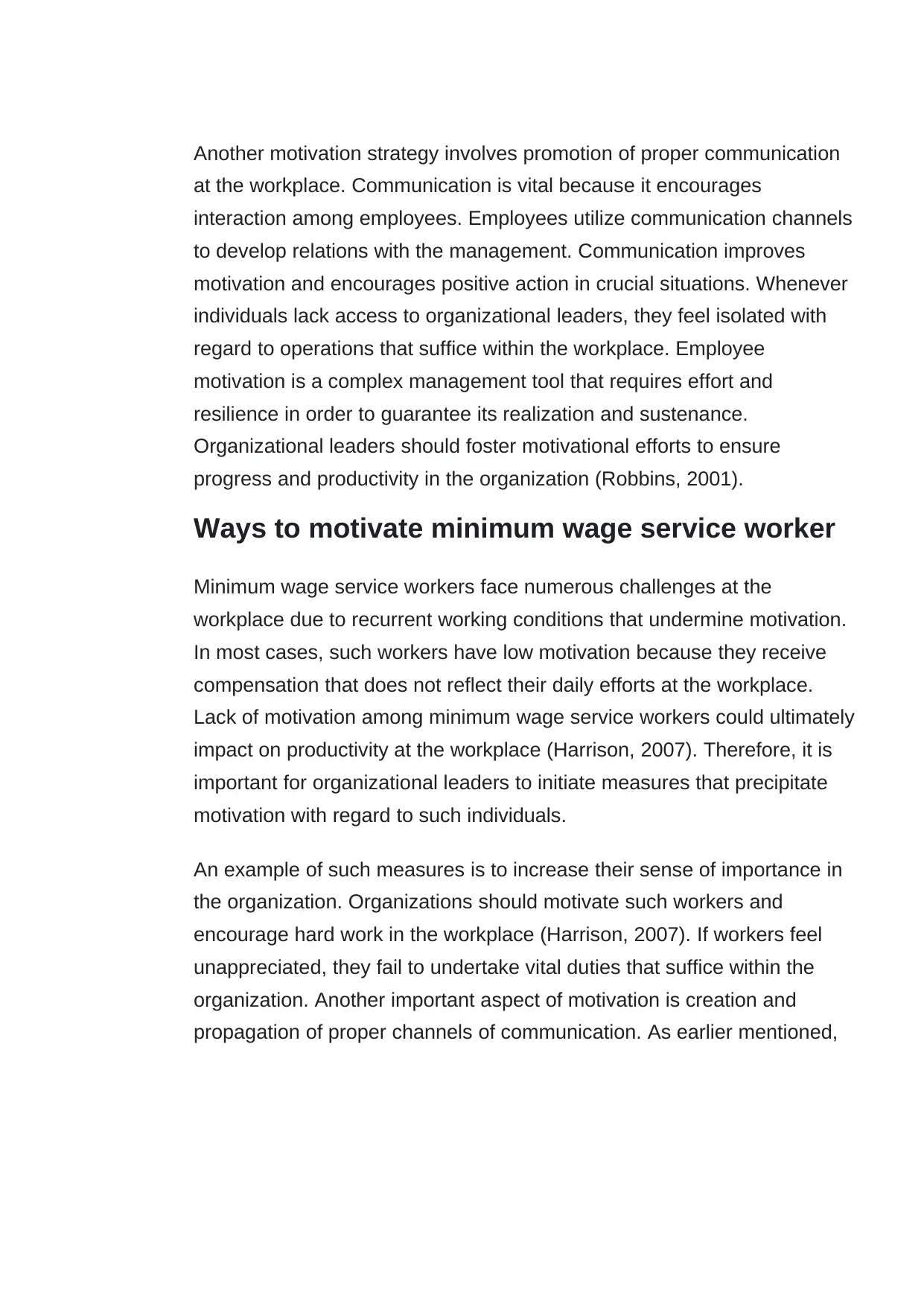
Another motivation strategy involves promotion of proper communication
at the workplace. Communication is vital because it encourages
interaction among employees. Employees utilize communication channels
to develop relations with the management. Communication improves
motivation and encourages positive action in crucial situations. Whenever
individuals lack access to organizational leaders, they feel isolated with
regard to operations that suffice within the workplace. Employee
motivation is a complex management tool that requires effort and
resilience in order to guarantee its realization and sustenance.
Organizational leaders should foster motivational efforts to ensure
progress and productivity in the organization (Robbins, 2001).
Ways to motivate minimum wage service worker
Minimum wage service workers face numerous challenges at the
workplace due to recurrent working conditions that undermine motivation.
In most cases, such workers have low motivation because they receive
compensation that does not reflect their daily efforts at the workplace.
Lack of motivation among minimum wage service workers could ultimately
impact on productivity at the workplace (Harrison, 2007). Therefore, it is
important for organizational leaders to initiate measures that precipitate
motivation with regard to such individuals.
An example of such measures is to increase their sense of importance in
the organization. Organizations should motivate such workers and
encourage hard work in the workplace (Harrison, 2007). If workers feel
unappreciated, they fail to undertake vital duties that suffice within the
organization. Another important aspect of motivation is creation and
propagation of proper channels of communication. As earlier mentioned,
at the workplace. Communication is vital because it encourages
interaction among employees. Employees utilize communication channels
to develop relations with the management. Communication improves
motivation and encourages positive action in crucial situations. Whenever
individuals lack access to organizational leaders, they feel isolated with
regard to operations that suffice within the workplace. Employee
motivation is a complex management tool that requires effort and
resilience in order to guarantee its realization and sustenance.
Organizational leaders should foster motivational efforts to ensure
progress and productivity in the organization (Robbins, 2001).
Ways to motivate minimum wage service worker
Minimum wage service workers face numerous challenges at the
workplace due to recurrent working conditions that undermine motivation.
In most cases, such workers have low motivation because they receive
compensation that does not reflect their daily efforts at the workplace.
Lack of motivation among minimum wage service workers could ultimately
impact on productivity at the workplace (Harrison, 2007). Therefore, it is
important for organizational leaders to initiate measures that precipitate
motivation with regard to such individuals.
An example of such measures is to increase their sense of importance in
the organization. Organizations should motivate such workers and
encourage hard work in the workplace (Harrison, 2007). If workers feel
unappreciated, they fail to undertake vital duties that suffice within the
organization. Another important aspect of motivation is creation and
propagation of proper channels of communication. As earlier mentioned,
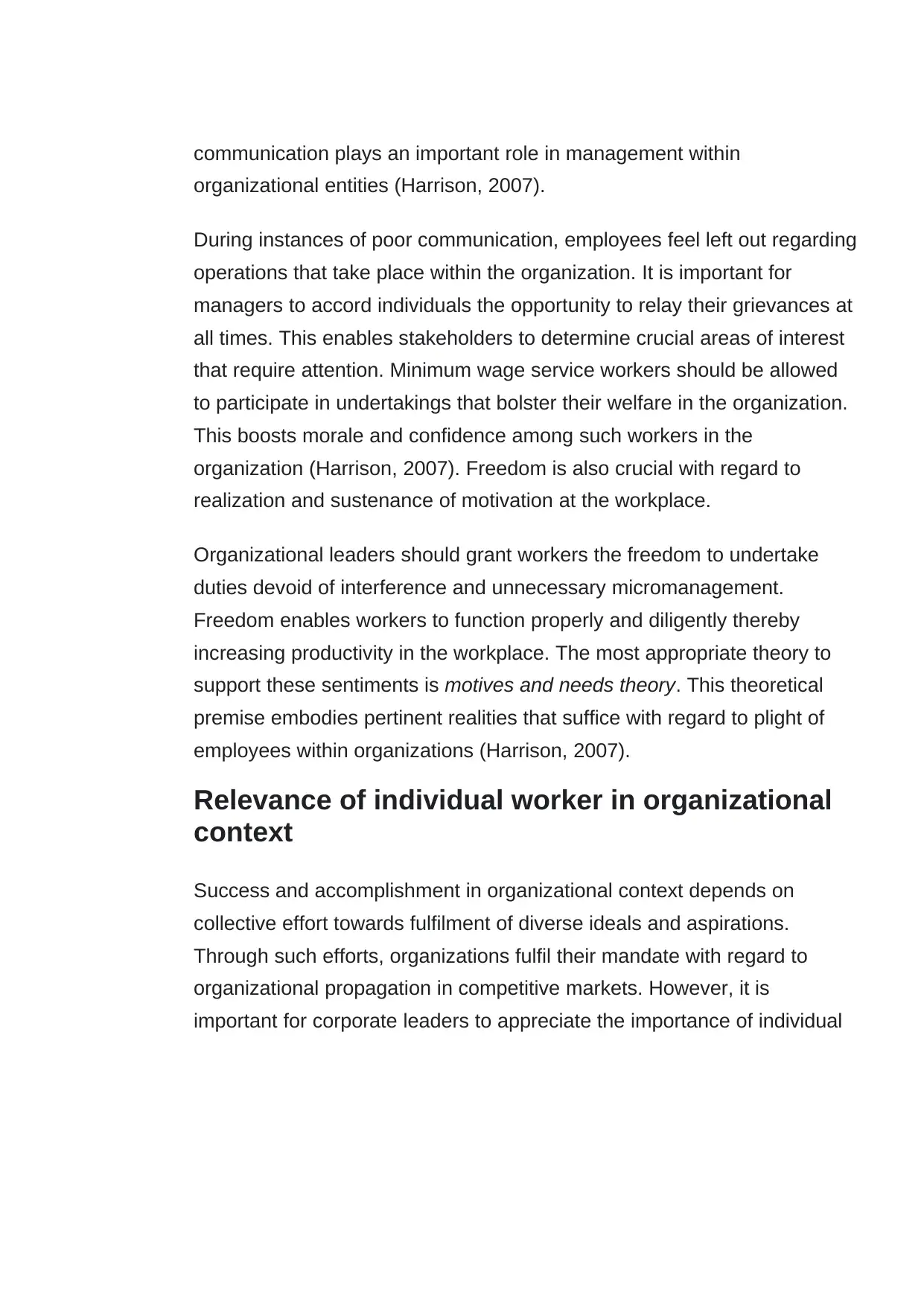
communication plays an important role in management within
organizational entities (Harrison, 2007).
During instances of poor communication, employees feel left out regarding
operations that take place within the organization. It is important for
managers to accord individuals the opportunity to relay their grievances at
all times. This enables stakeholders to determine crucial areas of interest
that require attention. Minimum wage service workers should be allowed
to participate in undertakings that bolster their welfare in the organization.
This boosts morale and confidence among such workers in the
organization (Harrison, 2007). Freedom is also crucial with regard to
realization and sustenance of motivation at the workplace.
Organizational leaders should grant workers the freedom to undertake
duties devoid of interference and unnecessary micromanagement.
Freedom enables workers to function properly and diligently thereby
increasing productivity in the workplace. The most appropriate theory to
support these sentiments is motives and needs theory. This theoretical
premise embodies pertinent realities that suffice with regard to plight of
employees within organizations (Harrison, 2007).
Relevance of individual worker in organizational
context
Success and accomplishment in organizational context depends on
collective effort towards fulfilment of diverse ideals and aspirations.
Through such efforts, organizations fulfil their mandate with regard to
organizational propagation in competitive markets. However, it is
important for corporate leaders to appreciate the importance of individual
organizational entities (Harrison, 2007).
During instances of poor communication, employees feel left out regarding
operations that take place within the organization. It is important for
managers to accord individuals the opportunity to relay their grievances at
all times. This enables stakeholders to determine crucial areas of interest
that require attention. Minimum wage service workers should be allowed
to participate in undertakings that bolster their welfare in the organization.
This boosts morale and confidence among such workers in the
organization (Harrison, 2007). Freedom is also crucial with regard to
realization and sustenance of motivation at the workplace.
Organizational leaders should grant workers the freedom to undertake
duties devoid of interference and unnecessary micromanagement.
Freedom enables workers to function properly and diligently thereby
increasing productivity in the workplace. The most appropriate theory to
support these sentiments is motives and needs theory. This theoretical
premise embodies pertinent realities that suffice with regard to plight of
employees within organizations (Harrison, 2007).
Relevance of individual worker in organizational
context
Success and accomplishment in organizational context depends on
collective effort towards fulfilment of diverse ideals and aspirations.
Through such efforts, organizations fulfil their mandate with regard to
organizational propagation in competitive markets. However, it is
important for corporate leaders to appreciate the importance of individual
Paraphrase This Document
Need a fresh take? Get an instant paraphrase of this document with our AI Paraphraser
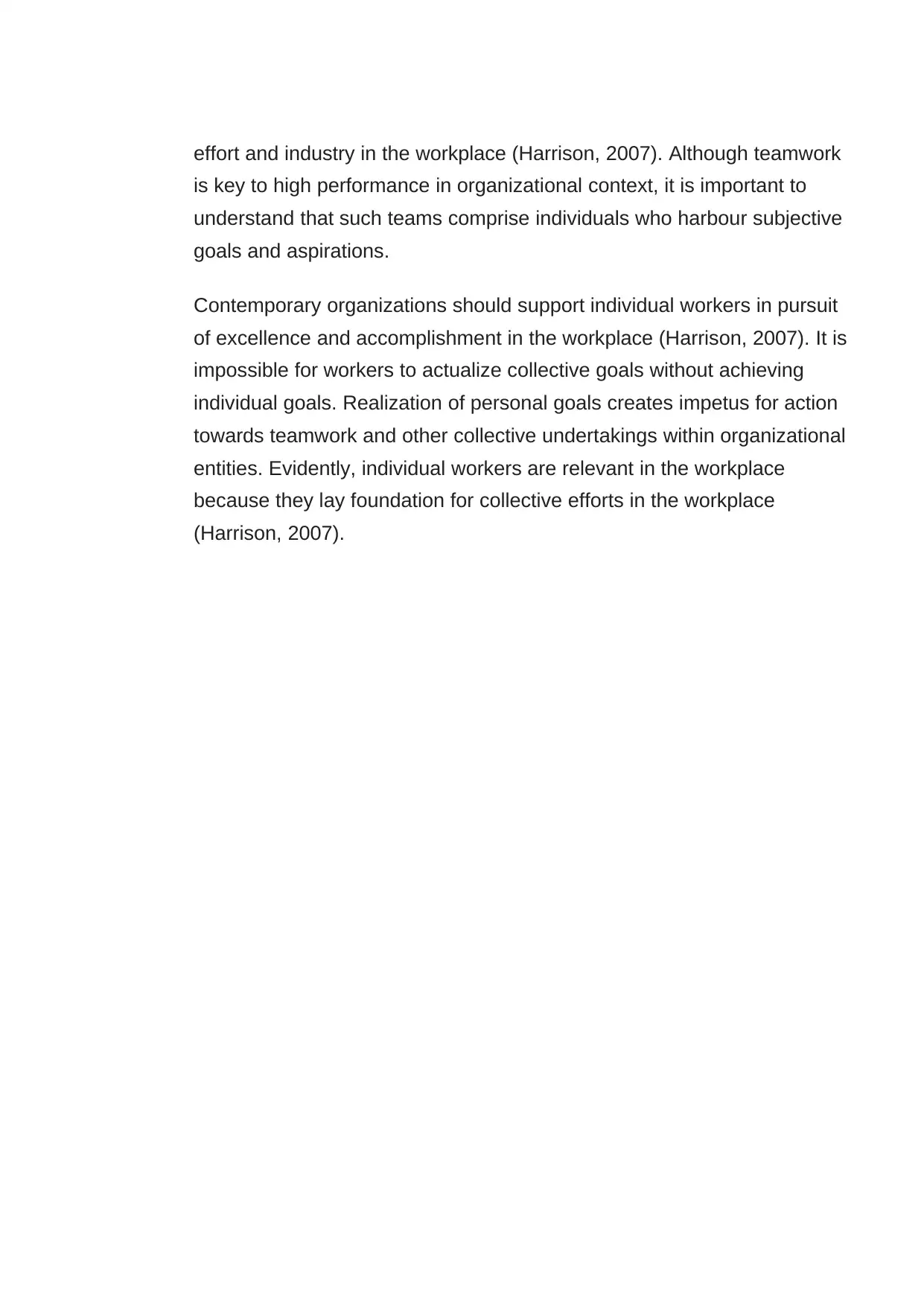
effort and industry in the workplace (Harrison, 2007). Although teamwork
is key to high performance in organizational context, it is important to
understand that such teams comprise individuals who harbour subjective
goals and aspirations.
Contemporary organizations should support individual workers in pursuit
of excellence and accomplishment in the workplace (Harrison, 2007). It is
impossible for workers to actualize collective goals without achieving
individual goals. Realization of personal goals creates impetus for action
towards teamwork and other collective undertakings within organizational
entities. Evidently, individual workers are relevant in the workplace
because they lay foundation for collective efforts in the workplace
(Harrison, 2007).
is key to high performance in organizational context, it is important to
understand that such teams comprise individuals who harbour subjective
goals and aspirations.
Contemporary organizations should support individual workers in pursuit
of excellence and accomplishment in the workplace (Harrison, 2007). It is
impossible for workers to actualize collective goals without achieving
individual goals. Realization of personal goals creates impetus for action
towards teamwork and other collective undertakings within organizational
entities. Evidently, individual workers are relevant in the workplace
because they lay foundation for collective efforts in the workplace
(Harrison, 2007).
1 out of 8
Your All-in-One AI-Powered Toolkit for Academic Success.
+13062052269
info@desklib.com
Available 24*7 on WhatsApp / Email
![[object Object]](/_next/static/media/star-bottom.7253800d.svg)
Unlock your academic potential
© 2024 | Zucol Services PVT LTD | All rights reserved.

